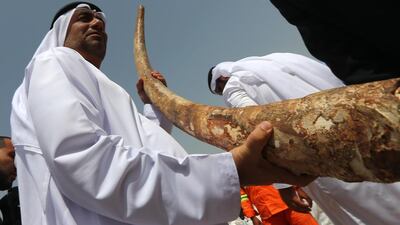Sunday marked World Environment Day, an occasion to recognise the importance of our fragile environment and flag up some issues that need tackling.
The theme this year was “Zero Tolerance for Illegal Wildlife Trade”, with the Minister of Climate Change and Environment, Dr Thani Al Zeyoudi, noting in a statement that the trade has reached “unprecedented levels in recent years”.
It's now estimated to be worth up to $20 billion (Dh 73bn) a year, excluding illegal, unreported and unregulated fisheries and the illegal trade in timber, which perhaps add another $30bn. As William Hague, former British foreign minister, has commented: "This is more than just an environmental crime ... [It] is now recognised as a serious and organised transnational crime. It drives corruption, is linked to money-laundering, and it can damage economic development in many of the world's poorest countries and communities.”
It's little surprise, then, that the practitioners of the trade, in particular those smuggling illegally-obtained wildlife and wildlife products around the world, often have connections with drug dealers, terrorists and a variety of organised crime networks as well as links to corrupt government officials.
In this country we have little native wildlife that is likely to attract the attention of the smuggling networks, although I have heard concerns expressed about the spider-collecting fraternity becoming interested in some of our little-known tarantulas. Fortunately, over the last couple of decades, the illegal hunting of whales in the UAE's offshore waters in the Gulf of Oman appears to have come to an end. That doesn't mean, though, that the UAE has no connections to the trade.
As a major international transport hub, through its ports and airports, the UAE is not just a potential, but an actual, transit point for smuggled wildlife products. That was shown in April last year when the Ministry of Environment and Water, as it was then known, along with Dubai Municipality, Dubai Airport and Dubai Customs, destroyed a stockpile of over 10 tonnes of elephant ivory that had been seized from planes and ships while on its way to customers elsewhere.
The Convention on International Trade in Endangered Species of Wild Fauna and Flora, of which the UAE is a signatory, imposes controls on the trade in large and dangerous animals like tigers, lions and other big cats, and there are local rules against keeping them without proper approvals. Yet a quick Google search throws up numerous stories of such animals being spotted here as they are driven around in cars or when they escape. In many cases, it's evident that they have been treated badly – one cheetah died shortly after it was rescued – while the country's zoos and vets have plenty of tales to tell about how such “trophy pets” are mistreated. These live animals, too, are victims of the wildlife trade.
In February 2014, the UAE was among more than 40 countries that signed the London Declaration on the elimination of the illegal trade in wildlife. Since then, some of our major organisations involved in the transport industry, such as Emirates and DP World, have taken admirable steps to promote greater awareness about wildlife crime in their industry, not just here but internationally.
Much more needs to be done. That's partly because of the threat that the trade poses to some of the world's most charismatic wildlife, as well as to a whole host of other species which attract less attention, from tortoises to lizards to birds. It's also because of the dangerous influence of the billions of dollars that are involved, corrupting governments, organisations and individuals around the globe.
The UAE is proud of its role as a transport hub and of its reputation as a country which seeks to promote international best practice on the environment. It's right that the UAE's efforts against the wildlife trade should be stepped up.
Peter Hellyer is a consultant specialising in the UAE’s history and culture


